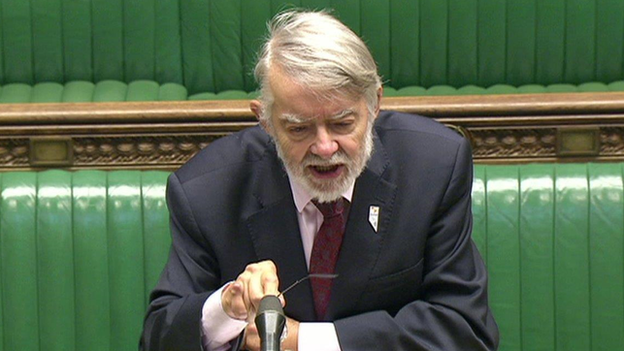Plan to axe Welsh MPs sparks Commons row
- Published
- comments

Paul Flynn: our democracy is degraded and 'heading into further distress'
Welsh MPs are getting their retaliation in first ahead of the publication on September 13 of plans to cut their number by a quarter.
The Boundary Commission for Wales will set out a new parliamentary map of Wales, a Wales with 29 rather than the current 40 MPs.
In the same week, MPs will conclude their debates on the Wales Bill, external, which is designed to simplify the devolution settlement.
Shadow Leader of the Commons (and Shadow Welsh Secretary) Paul Flynn linked the two events during his latest appearance in the House of Commons. He suggested they would illustrate "the degraded system that our democracy is and the way it's heading into further distress".
'Trebled'
He added: "The Welsh Bill won't guarantee in any way a compensatory increase in the number of members of the Welsh Assembly, although their work level has trebled.
"But in the future Wales will lose eleven of the 40 MPs, will lose the four MEPs that represent Wales and we've got this great turmoil in our democratic system when the disgrace of buying places in the House of Lords continues."
Mr Flynn, whose own work level has increased in recent months, didn't mention that the Wales Bill will actually give the assembly the power to increase the number of AMs, should it wish.
But he did criticise the boundary changes as likely to disenfranchise two million people (across England and Wales) and favour only the Conservatives.
'Disheartened'
Commons leader David Lidington told Mr Flynn: "I was sorry by the disparaging tone you adopted towards the Wales Bill because after all what this government's record in Wales has been about is delivering the increased devolution which the Welsh people, the Welsh Assembly and political parties, for the most part in Wales, have been saying that they wanted to see
"And I was...I suppose I wasn't shocked.....I was disheartened by the critical remarks he threw in about the approach of the parliamentary Boundary Commission and the framework within which they are operating."
It transpired that Mr Lidington had been flicking through Mr Flynn's memoirs, in which there is strong praise for the Chartists, who, said the Commons leader, favoured constituencies with equal numbers of electors in each constituency.
"I'd have thought he'd have been cheering us on and not criticising us for doing it."
You can read more about the review here, external.